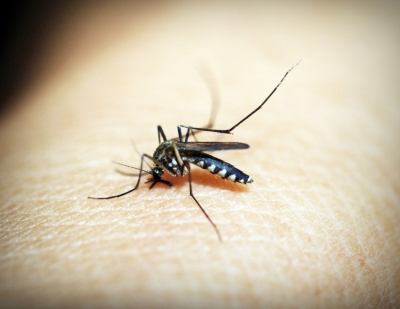WHO-recommended spatial repellants effective for tackling malaria: Study
By IANS | Updated: August 27, 2025 17:45 IST2025-08-27T17:44:57+5:302025-08-27T17:45:10+5:30
New Delhi, Aug 27 Spatial repellents -- called a "spatial emanator" can prevent mosquito bites and offer significant ...

WHO-recommended spatial repellants effective for tackling malaria: Study
New Delhi, Aug 27 Spatial repellents -- called a "spatial emanator" can prevent mosquito bites and offer significant protection against malaria, according to a study.
Researchers from the University of California-San Francisco, US, said that spatial repellents are a relatively new class of insecticide that can be disseminated on something the size of a sheet of paper, offering protection for up to a year against mosquitoes that spread malaria, as well as dengue, West Nile, yellow fever, and Zika.
In a systematic review, appearing in the journal eBioMedicine, the team analysed more than 25 years of data on some 1.7 million mosquitoes.
The findings showed that this “spatial emanator" distributes chemicals through the air and can prevent more than one out of every two mosquito bites.
The analysis comes just as the World Health Organization (WHO) recently recommended the use of spatial emanators, the first new vector control product class available in more than 40 years.
Spatial emanators can be used day and night, and do not require heating or electricity, making them easy to use in remote areas in Africa, South America, and Southeast Asia, where malaria is prevalent.
"We finally have a new way to protect against mosquito bites, especially one that fills in some of the gaps of our existing methods," said Ingrid Chen, Associate Professor of epidemiology and biostatistics at UCSF.
"It's lightweight, affordable, and easy to use, so it can be used to help save lives in all parts of the world," added Chen.
Malaria killed 597,000 people in 2023, the vast majority of whom were children under five years old in sub-Saharan Africa. Malaria has not been endemic to the U.S. since the 1950s, although locally transmitted cases occasionally occur in places like Florida and Texas.
Insecticide-treated nets generally only protect people indoors and at night; other topical repellents are expensive and need to be regularly reapplied. Insecticide-treated coils create smoke and last only a few hours.
But the new class of spatial repellent uses chemicals that are similar to those in treated bed nets -- which are considered safe -- but in a more volatile form.
The study noted that the tool also protects against all types of mosquitoes that carry disease, although with varying levels of efficacy.
Disclaimer: This post has been auto-published from an agency feed without any modifications to the text and has not been reviewed by an editor
Open in app